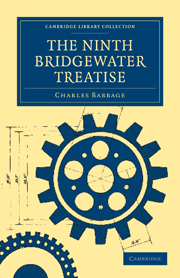Book contents
- Frontmatter
- Contents
- Preface
- Title in the Series
- CHAPTER I Nature of the Argument
- CHAPTER II Argument in favour of Design from the changing of Laws in Natural Events
- CHAPTER III Argument to show that the Doctrines in the preceding Chapter do not lead to Fatalism
- CHAPTER IV On the Account of the Creation, in the First Chapter of Genesis
- CHAPTER V Further View of the same Subject
- CHAPTER VI Of the Desire of Immortality
- CHAPTER VII On Time
- CHAPTER VIII Argument from Laws intermitting—on the Nature of Miracles
- CHAPTER IX On the permanent Impression of our Words and Actions on the Globe we inhabit
- CHAPTER X On Hume's Argument against Miracles
- CHAPTER XI À priori Argument in favour of the Occurrence of Miracles
- CHAPTER XII Thoughts on the Nature of Future Punishments
- CHAPTER XIII Reflections on Free Will
- CHAPTER XIV Thoughts on the Origin of Evil
- CONCLUSION
- APPENDIX
- CORRECTIONS
CHAPTER III - Argument to show that the Doctrines in the preceding Chapter do not lead to Fatalism
Published online by Cambridge University Press: 05 October 2010
- Frontmatter
- Contents
- Preface
- Title in the Series
- CHAPTER I Nature of the Argument
- CHAPTER II Argument in favour of Design from the changing of Laws in Natural Events
- CHAPTER III Argument to show that the Doctrines in the preceding Chapter do not lead to Fatalism
- CHAPTER IV On the Account of the Creation, in the First Chapter of Genesis
- CHAPTER V Further View of the same Subject
- CHAPTER VI Of the Desire of Immortality
- CHAPTER VII On Time
- CHAPTER VIII Argument from Laws intermitting—on the Nature of Miracles
- CHAPTER IX On the permanent Impression of our Words and Actions on the Globe we inhabit
- CHAPTER X On Hume's Argument against Miracles
- CHAPTER XI À priori Argument in favour of the Occurrence of Miracles
- CHAPTER XII Thoughts on the Nature of Future Punishments
- CHAPTER XIII Reflections on Free Will
- CHAPTER XIV Thoughts on the Origin of Evil
- CONCLUSION
- APPENDIX
- CORRECTIONS
Summary
If all the combinations and modifications of matter can be supposed to be traced up to one general and comprehensive law, from which every visible form, both in the organic and inorganic world flows, as the necessary consequence of the first impression of that law upon matter, it might seem to follow that Fate or Necessity governs all things, and that the world around us may not be the result of a contriving mind working for a benevolent purpose.
Such, possibly, may be the first impression of this view of the subject; but it is an erroneous view,—one of those, perhaps, through which it is necessary to pass, in order to arrive at truth. Let us briefly review the labour which the human race has expended, in attaining the limited knowledge we possess. For about six thousand years man has claimed the earth as his heritage, and asserted his dominion over all other beings endued with life; yet, during a large portion of that period, how comparatively small has been his mental improvement! Until the invention of printing, the mass of mankind were in many respects almost the creatures of instinct. It is true, the knowledge possessed by each generation, instead of being the gift of Nature, was derived from the instruction of their predecessors; but, how little were those lessons improved by repeated communication! Transmitted most frequently by unenlightened instructors, they might lose, but could rarely gain in value.
- Type
- Chapter
- Information
- The Ninth Bridgewater Treatise , pp. 50 - 62Publisher: Cambridge University PressPrint publication year: 2009First published in: 1837



